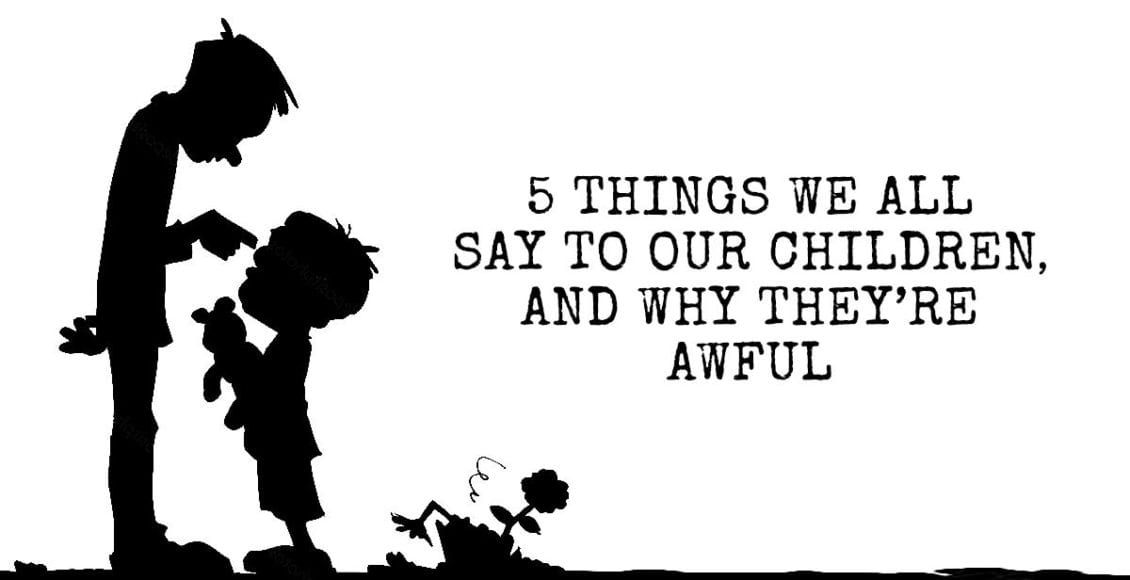“I believe that what we become depends on what our fathers teach us at odd moments, when they aren’t trying to teach us. We are formed by little scraps of wisdom,” wrote Umberto Eco.
What are you teaching your children when you aren’t trying to teach them a thing?
Here are five common phrases that most parents (including myself) are known to use – and why we should all stop immediately:
1. “You’re driving me nuts right now.”
This is probably true close to a hundred times every day. However, there are lots of things that are true which we don’t need to say to our children. Telling your child that they are making you crazy, angry, or otherwise out of control teaches them that they are responsible for the behavior of others.
This is unfair. Children seem to find a way to blame themselves for everything. We don’t need to help in this. Instead, set an example of emotional regulation. Try a statement like “Mommy is having a very hard time being patient, so I am going to take some time out to calm down.” Then, go do it – you deserve a break!
2. “Because I said so!”
This statement, more clearly than any other, demands a blind sense of obedience when it comes to authority. It discourages problem solving, free thinking, and even a simple desire to understand the rules. We want to encourage intellectual curiosity in our children – not crush it. Show your children that they deserve an explanation for the behaviors that are asked of them. Place value on their curiosity. Encourage them to think in a critical way. They don’t need to agree with your reasoning – but they do have a right to know what it is if they are expected to follow your rules.
3. “Stop crying right now!”
This phrase has never, in the history of crying, helped to solve the problem. It only serves to add a sense of fear, panic, and lack of control to an already difficult situation. Think about it – when’s the last time you heard an adult say “I was really upset, but then my husband yelled at me to stop crying, and I felt so much better”? Crying in itself is not misbehavior. In fact, as far as expressing negative emotions, crying is one of the healthier behaviors our children can turn to.
4. “That’s life.”
We often turn to this phrase when we have nothing else to offer. We know the situation is wrong or unfair. We know our children are hurt by it. Unfortunately, there is nothing we can do. This phrase is an easy cop-out, but it does nothing to help our children work through their disappointment.
In fact, it teaches them to just accept the worst aspects of living – even if they find them unacceptable. Instead, turn to some deeper words of wisdom. Try using the
We often turn to this phrase when we have nothing else to offer. We know the situation is wrong or unfair. We know our children are hurt by it. Unfortunately, there is nothing we can do. This phrase is an easy cop-out, but it does nothing to help our children work through their disappointment. In fact, it teaches them to just accept the worst aspects of living – even if they find them unacceptable. Instead, turn to some deeper words of wisdom.
Try using the serenity prayer: “God, grant me the serenity to accept the things I cannot change; courage to change the things I can; and wisdom to know the difference.” Squeeze their hand and reassure them that this, too, shall pass. If possible, find a way to take action against the problem itself. Teach your children that they are powerful – not powerless.
5. “You’re overreacting. Stop being so sensitive.”
This tells our children that their feelings don’t matter. It also discourages them from showing empathy for others when they are upset. When we tell them they are wrong for being emotional, we are teaching our children that feeling emotions is a sign of weakness. This phrase teaches them to devalue the emotional expression of others and internalize their own emotions. It also carries a hint of victim blaming – it’s your fault for getting upset. Instead, we need to be teaching our children to respect the emotions of others, and to understand their own feelings and cope with them responsibly.
“Children have never been very good at listening to their elders, but they have never failed to imitate them,” wrote James Baldwin.
Be the kind of parent you wish you had. Be the kind of adult you want your children to grow into. It’s okay to make mistakes – we’re all only human – but don’t keep making the same ones over and over.



